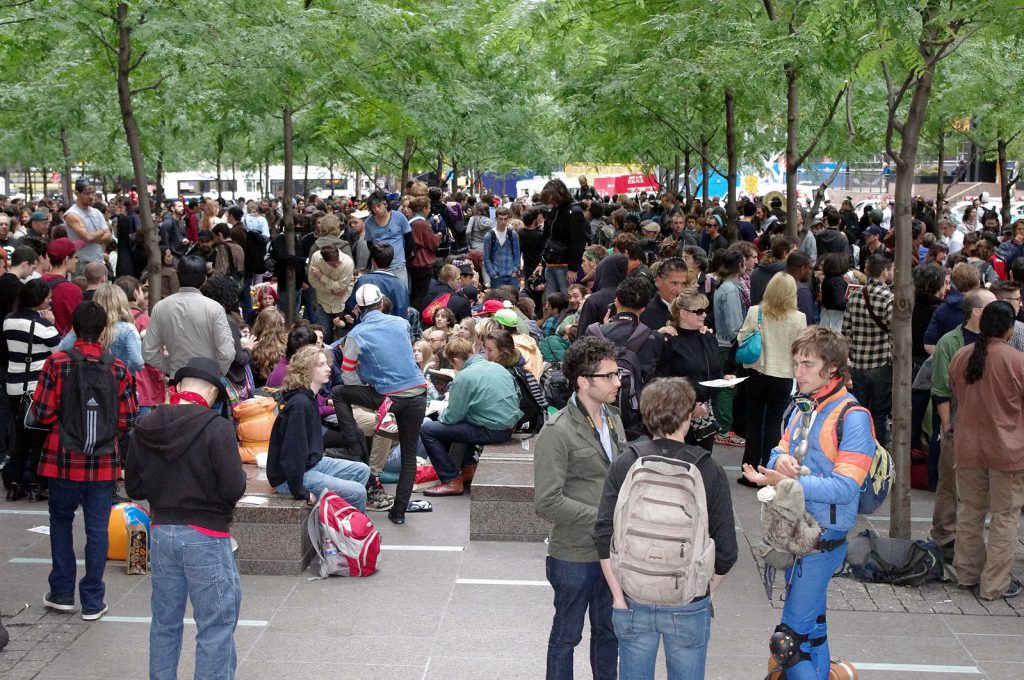
On 17 September 2011, a group of protesters began to occupy Zuccotti Park, in New York’s financial district. They were acting partly in response to a call from Adbusters, the Vancouver-based magazine and media foundation, made earlier in the summer. That call invoked the spirit of Tahrir Square, which had been the centre of the uprising in Cairo in January, as of the encampments of Los Indignados, which had taken place since May across cities in Spain. The gathering in Zuccotti Park grew, partly as a result of attempts by police to close it down; over the next few weeks, parallel actions took place in cities around the world. The protest was at once political, inspired by anarchist thought and practice, and theatrical, an antic and dadaist spectacle.
Speaking to protesters in Zuccotti Park recently, I got the sense that they wished people would stop demanding a demand because the idea of one was of little interest to them. It seemed beside the point. What they cared about was the ‘process’, a way of thinking and interacting exemplified by their daily General Assembly meetings and the crowded, surprisingly well-mannered village they had created on the 33,000 square feet of concrete that comprises Zuccotti Park.
Michael Greenberg, ‘In Zuccotti Park’, 2011
It was also an experiment in sustained, collective action. It was a camp, an ancient social form adopted as the basis for social and political innovation. It had a kitchen, a sleeping zone, a medical facility and bins of books, a ‘People’s Library’. It developed a division of labour, distributed across working groups tasked with functions such as cleaning, or liaising with supporters. It had its own energy source, using fixed bicycles to power batteries for heaters, kitchen appliances. It had a phone charging station, and a nerve centre of closely guarded computer equipment. It produced a newspaper, the Occupied Wall Street Journal, and streamed its activities live on the internet. It had a system of policing by ‘swarming’, in which miscreants were surrounded by bystanders.
It had a means of collective deliberation and decision making, the General Assembly. Because the protesters had no permit to use amplification in a public space, GA meetings were conducted by means of ‘the people’s mike’, with which a speaker was made audible by the crowd repeating his or her words; agreement and disagreement were signalled by an elaborate system of hand gestures among the audience. More generally, beyond the General Assembly, living in Zuccotti Park was characterised by endless, spontaneous talking. Notably – notoriously – the protesters refused to make any specific political demands. They were frequently challenged to do so, and spent much time debating whether or not they should. What mattered for them, the point of it all, was what they referred to as ‘the process’.
Occupy Wall Street and the wider protests of which it was part raise many questions. These have to do with the inequalities and unsustainabilities of the prevailing capitalist economic order, the inadequacies of its corollary political order (parliamentary democracy), and the opportunities and risks associated with its rapidly evolving energy and information technologies. But the immediate question they prompted was ‘What do you want?’. I think that was the wrong question, both for those who asked it (who seemed to conclude that the answer was ‘nothing’) and for those it was asked of (for whom there was no answer). The real question was not ‘What do you want?’, but ‘What are you doing?’
Not, however, as if to this end we had to hunt out new facts; it is, rather, of the essence of our investigation that we do not seek to learn anything new by it. We want to understand something that is already in plain view. For this is what we seem in some sense not to understand.
Ludwig Wittgenstein, Philosophical Investigations, 1953